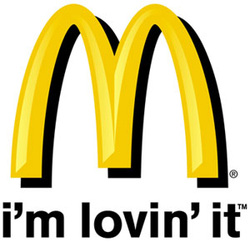
Commercials, viral videos, and all other forms of advertising have been criticized for their "exaggerations" "scams", and even "lies". When someone bring up this option with me personally one specific image comes to mind, Fast Food Commercials.
Ahhh Yes! the lovely and deceiving McDonald's, Wendy's, Burger King etc. commercials that reveal images of deliciously glorious looking burgers. Well its one thing on TV and something completely different, even incomparable in real life.
Recently McDonald's had realized the innumerable objections to what customers were seeing on TV and the product they were actually getting. Additionally, McDonald's ran numerous social media efforts that had been meant to illustrate personal experiences with McDonald's. This effort backfired and consumers Tweeted about their horror stories and unhappiness with the food and its' appearance.
In response the corporation created it's own viral campaign revealing the type of photo editing that went into creating a commercial. The end result is the video "Our Food. Your Questions," which debuted at No. 2 on the Viral Video Chart, with 5 million views.In detail, the video spends extra time illustrating how a food stylist painstakingly browns the burger's edges and places each piece of cheese, pickle and onion before strategically injecting the sandwich with ketchup and mustard. Compared with the Big Mac you are served in minutes at your local store, this process takes hours and seems to explain why the burger looks so much better in advertisements. In all, the video, seems like an effort by McDonald's to take control of its brand image online, to expose the inner workings of the company instead of letting someone else do it which has gotten a positive response from their audience.
See the video for yourself.
(source.)
Ahhh Yes! the lovely and deceiving McDonald's, Wendy's, Burger King etc. commercials that reveal images of deliciously glorious looking burgers. Well its one thing on TV and something completely different, even incomparable in real life.
Recently McDonald's had realized the innumerable objections to what customers were seeing on TV and the product they were actually getting. Additionally, McDonald's ran numerous social media efforts that had been meant to illustrate personal experiences with McDonald's. This effort backfired and consumers Tweeted about their horror stories and unhappiness with the food and its' appearance.
In response the corporation created it's own viral campaign revealing the type of photo editing that went into creating a commercial. The end result is the video "Our Food. Your Questions," which debuted at No. 2 on the Viral Video Chart, with 5 million views.In detail, the video spends extra time illustrating how a food stylist painstakingly browns the burger's edges and places each piece of cheese, pickle and onion before strategically injecting the sandwich with ketchup and mustard. Compared with the Big Mac you are served in minutes at your local store, this process takes hours and seems to explain why the burger looks so much better in advertisements. In all, the video, seems like an effort by McDonald's to take control of its brand image online, to expose the inner workings of the company instead of letting someone else do it which has gotten a positive response from their audience.
See the video for yourself.
(source.)

 RSS Feed
RSS Feed